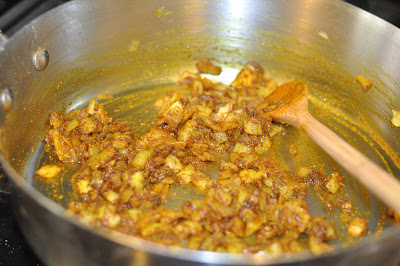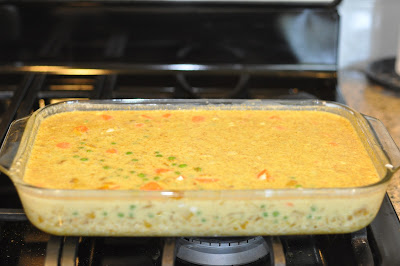Writing this series on grocery budgets sure motivated me last week! I got all inspired to try a little harder to keep exactly to our budget this month. I knew this would be a hard month to not go over budget because we had a super large Costco bill as well as a co-op bill (I only order from our co-op every other month, so this was a biggie), and we are celebrating two birthdays in our family. Nevertheless, I proceeded to go over my weekly menu and grocery list and change things and slice items until it seemed my list for this week would help keep us in line for the month.
I hadn't finished doing so and celebrating my success for more than maybe an hour before I got an email reminder that we signed up to provide the dessert for our weekly community group this week. That normally wouldn't be too big of a deal, but I realized that since we would be celebrating birthdays, one being my son Erik's, I wanted to make a nice birthday cake and an allergen-friendly one at that. So I looked up the recipe for the
chocolate cake I made for Elise's birthday last week and added a couple of things to the grocery list. Then hubby added a couple of items to the list that he had just run out of. And of course I realized I had left off a couple of important things I needed for our meals and for baby who is just starting to eat more solids. Sigh. There went my amazing, and inexpensive, grocery list!
Thankfully we didn't spend much money on groceries last month so I think it will even out, but the whole situation made me simultaneously very irritated and very amused. For the sake of my health though I think I will let go of the irritation and hold on to the amusement!
Well, even though I am clearly far from an expert on food budgeting, this week I am still going to share the few things that have helped us keep our monthly costs as low as they are (our monthly bill could easily be much, much higher). The first thing that has saved us money, which is what I am talking about today, is learning which stores carry the food we eat for the best prices. This might seem like a no-brainer, but I have to mention it because I think it has played the biggest role in us keeping our budget down. For me, being able to find the best stores involved 3 basic steps. I will be honest, the steps I am listing below took a bit of time and effort. However, they have paid off over time by saving us a lot of money!
1) I thought through all of my different options of where we could purchase our food items. This involved listing the different stores that were within a distance I was willing to drive, checking out online stores, and asking others were they found good deals. For me in Seattle the list of options included places like Safeway, Trader Joes, QFC, PCC, Amazon, Costco, Grocery Outlet, etc.
2) I window shopped the different stores. This step probably took me the longest because it was inconvenient. Once I had a fairly good idea of the kinds of food I was looking to buy, I would take trips to various stores, or check out websites for online stores, and compare and contrast different prices. I would often go somewhere with a food list in hand and just jot down the prices as I walked through the store. It would be very interesting to sometimes discover that one store might be very pricey overall, yet carry a couple of our main grocery items for the best price, making it worth the drive. Some stores that I thought would give me lots of good deals ended up just not being worth it for me. Point is, you won't really know until you do your research and check things out.
3) I landed on a shopping plan that was the most cost effective yet also maintainable. I am sure that if I wanted the best deals for every single food item we purchase, I could save a little more money by traveling to 5 different stores each week. But at that point it is simply not sustainable or even worth all the extra effort. I had to decide which stores were most worth me driving to on a regular basis, or worth the shipping if they were online stores. We do have quite the list of different places we purchase from, but our shopping plan is doable for us and I think overall we are getting the best possible prices.
Here the basic shopping plan I landed on:
Weekly I visit Trader Joe's and Whole Foods. I get most of our produce from TJs. I have heard many people say how terrible their produce is, but I have had pretty good luck with the things we eat, and their prices on organic produce are so great. I also get things like organic peanut butter, organic rice pasta and raw cashews there. The main reason I travel to Whole Foods is for our chicken and eggs. For the level of quality I decided I wanted on those items Whole Foods ended up giving the best deal I could find. I also get items from their bulk section, such as spices, dried fruit, dried beans, etc.
Monthly we make a trip to Costco. There we buy bananas, organic apples, canned beans (which I hope to make from scratch instead someday), organic quinoa, organic rice milk, etc.
Every other month I purchase from a co-op called Azure Standard, which requires that I pick up my order. I will write more about this another time, but it has saved us a lot of money over the past couple of years. We get our grains, nuts and seeds from them and various other items depending on their prices, which do fluctuate a lot.
Our other stores are online stores. For example, we purchase goji berries and coconut oil from Amazon. I get our raw honey and a few other items from Vitacost.com. We belong to Amazon's subscribe and save which gives us free shipping, and Vitacost gives free shipping when you order is more than $49.
Knowing the different stores you have available to you and which ones will give your family the best deals for what you eat is crucial to keeping the grocery budget down. If you haven't already done so I highly recommend sitting down and taking some time to research your different shopping options and consider how a new shopping plan might save you some money. Tomorrow I will share a few other tips that have helped our family save!















